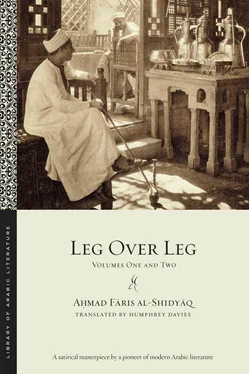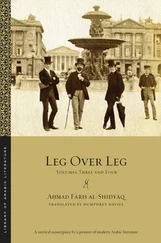454Cairo ( Miṣr ): the author uses the word, as Egyptians often do, to refer to the capital city rather than the country as a whole.
455“answering to the needs of hot-humored men (contrary to what ʿAbd al-Laṭīf al-Baghdādī has said)”: in his brief description of Cairo, al-Baghdādī (557–629/1162–1231), a scholar from Baghdad, writes that “you rarely find among them diseases exclusively of the bile; indeed, the most prevalent types are those of the sputum, even among the youth and the hot-humored ( al-shabāb wa-l-maḥrūrīn )” (al-Baghdādī, Ifādah , 18), a comment to which the author gives an insinuating twist not intended by the original.
456The precise meaning or historical referent of a number of these teasingly described “curiosities” is unclear, and most of interpretations offered in the following notes are tentative.
457“on the ceiling or the walls”: perhaps a reference to depictions of women (or goddesses or nymphs) on the walls and ceilings of buildings done in the European style.
458“the treatment of the feminine as masculine and of the masculine as feminine” ( tadhakkur al-muʾannath wa-taʾannuth al-mudhakkar ): while the comment appears to refer to a linguistic practice, it is hard to know exactly which, as there is no whole-scale reversal of, for instance, noun gender in Egyptian Arabic vis-à-vis literary Arabic; perhaps the author has in mind the word raʾs (“head”), which is most often masculine in literary (and Levantine) Arabic but is feminine in its Egyptian form ( rās ), or the use of ḥabībī (“my dear,” masculine) as a term of endearment among women or bāsha (“pasha”) by men as a flirtatious term of address to a woman.
459“in their bathhouses they constantly recite a sura or two of the Qurʾan that mention ‘cups’ and ‘those who pass around with them,’” a reference to either Sūrat al-Zukhruf (Q Zukhruf 43:71 “ yuṭāfu ʿalayhim bi-ṣiḥāfin min dhahabin wa-akwāb ”—“There shall be passed among them platters of gold and cups”) or similarly Sūrat al-Insān (Insān 76:15); the author may be implying that the presence in the bathhouses of young boys offering refreshment stimulates the patrons into uttering these verses. Lane, in fact, states that it is considered improper to recite the Qurʾan in a bathhouse, as such places are inhabited by jinn (Lane, Manners , 337).
460“many of the city’s men have no hearts” etc.: perhaps meaning that they prefer sex to love.
461“they took to lopping off their fingers” ( fa-jaʿalū yashdhibūna aṣābiʿahum ): perhaps a reference to the chopping off of the index finger of the right hand by young men so as to render themselves incapable of pulling a trigger and hence unfit for military service, which was introduced by Egypt’s ruler, Muḥammad ʿAlī, in the 1820s.
462“veil their beards” ( yubarqiʿuna liḥāhum ): according to the Qāmūs , the expression means “to become a passive sodomite” ( ṣāra maʾbūnan ).
463“Sons of Ḥannā”: if the correction of the original from Ḥinnā is correct, this probably is a reference to Copts (Ḥannā is a common name among Christians).
464“a way of writing that is known to none but themselves”: Ottoman financial documents were written in a script known as qirmah (perhaps from Turkish kırmak “to break”), developed from the ruqʿah script, that was indecipherable to the uninitiated and so small that upward of thirty words and figures might be inscribed within an area of 1.5 square centimetres; it was not, in fact, peculiar to Egypt, but was introduced there by the Ottoman authorities (see El Mouelhy, “Le Qirmeh,”).
465“his family wail and keen over him in the hope that he will return to them”: perhaps the author is implying jokingly that such excessive (as he sees it) mourning must be intended to ensure the return of the deceased with gifts from the next world.
466“ignoble birds… may pretend to be mighty eagles” ( al-bughāth… yastansir ): a well-known idiom describing presumptuous behavior by the lowly.
467“the exiguously monied one (meaning the owner of the money)” ( al-muflis ay ṣāḥib al-fulūs ): the author knows that the reader is likely to understand muflis in its common sense of “bankrupt,” whereas he is using it in its original dictionary definition of “endowed with copper coins (after having owned silver coins)” ( Qāmūs ).
468“the rise in her fortunes came from her setting herself down” ( ṭāliʿuhā min maḥallihā ): it is supposed that unmarried guests at weddings often to meet their own future spouses there.
469“‘a kind of joking back and forth that resembles mutual insult’” ( mufākahah tushbihu l-sibāb ): this definition of mujārazah is from the Qāmūs ; from the description, anqāṭ resemble the twentieth-century pun-based qāfiyah , on which see Amīn, Qāmūs , 317–18.
470“Its viceroy” ( wālīhā ): Muḥammad ʿAlī Pasha, who ruled as an autonomous viceroy on behalf of the Ottoman sultan from 1805 to 1848 and laid the foundations of the modern Egyptian state.
471By the time of the publication of Al-Sāq , the author had attracted the favorable notice of the ruler of Tunis by writing odes in his praise and had twice visited the city, in 1841 and 1847 (see 3.18.3, 4.8.2). Later (1857–59), he would take up residence in Tunis and work for its government.
472“a poet of great skill”: identified by one scholar as Naṣr al-Dīn al-Ṭarābulsī (1770–1840), a Catholic from Aleppo who immigrated to Egypt in 1828 and came to direct the Arabic-language section of Al-Waqāʾiʿ al-Miṣriyyah , where the author was later employed (al-Maṭwī, Aḥmad , 1:76); elsewhere (2.10.1), the author refers to him as “Khawājā Yanṣur.”
473al-Āmidī: see 1.11.1. Al-āmidī’s detailed comparison of the poets al-Buḥturī and Abū l-Tammām distinguishes between the maṣnūʿ (“artificial”) and maṭbūʿ (“natural”) in poetry, but al-Āmidī’s concern is style rather than, as here, the motivation of the poet.
474Āmid: a city in southeastern Turkey, now called Diyarbakır.
475al-Bustī: Abū l-Fatḥ al-Bustī (335–400/946–1009), poet and prose stylist.
476Abū l-ʿAtāhiyah: a poet of Baghdad mainly known for his pious and censorious verse (131–211/748–826).
477Abū Nuwās: one of the most famous poets of the Abbasid “Golden Age,” especially in the fields of wine poetry and the love lyric (ca. 130–98/747–813).
478al-Farazdaq: Tammām ibn Ghālib, known as al-Farazdaq (“the Lump of Dough”), a satirist and panegyrist (d. 110/728 or 112/730).
479Jarīr: one of the greatest poets of the Umayyad period (ca. 33–111/653–729).
480Abū Tammām: Abbasid poet and anthologist (ca. 189–232/805–45).
481al-Mutanabbī: celebrated panegyrist and lampoonist (ca. 303–54/915–65).
482“Our Master Sulaymān’s ring”: this magic signet ring, sometimes referred to as a seal, allowed Sulaymān to command demons and talk to animals.
483“Zayd… ʿAmr”: Zayd and ʿAmr are names used to demonstrate grammatical points in examples memorized by school children.
484“a grave offense against him” ( mina l-mūbiqāti lahu ): perhaps because to do so might imply jealousy, or because both beauty and riches are regarded as gifts of God rather than qualities implying merit.
485“flap of skin” ( zanamah ): the author appears to have in mind the following among a number of definitions of this word given in the Qāmūs : “something cut off the ear of a camel and left hanging, done to the best bred.”
Читать дальше












